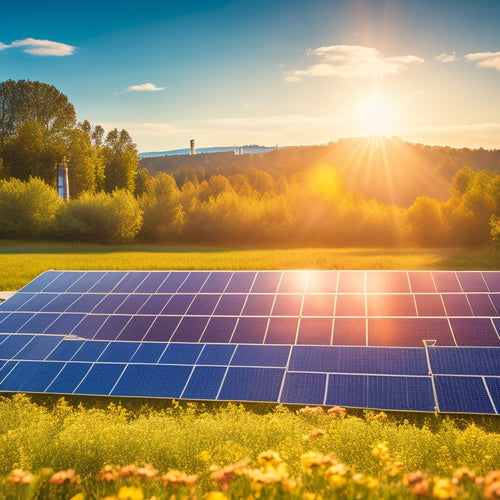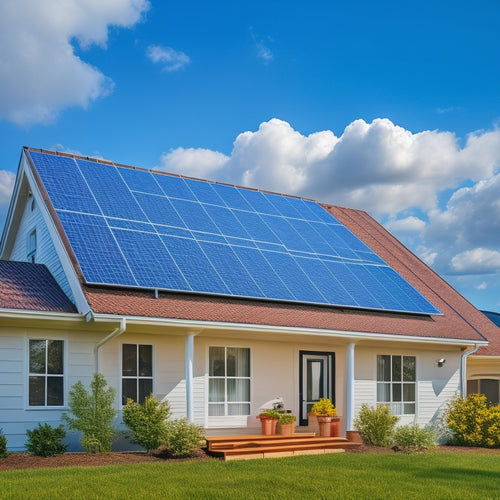
Solar Energy Farm
Share
You're investing in a solar energy farm, which guarantees a renewable energy source, economic growth, and a cleaner environment by utilizing the sun's infinite power. Your farm will promote energy independence, reduce reliance on non-renewable sources, and lower energy costs. Advanced forecasting and energy storage systems guarantee stable energy flow, and high-efficiency solar panels maximize energy production. Evaluating your energy demands is essential for sizing your farm, and with low maintenance costs, you can enjoy significant savings. As you investigate the benefits of solar energy farms, you'll uncover the technical innovations driving their success and the opportunities they provide for a sustainable future.
The Essentials
- Solar energy farms promote energy independence and renewable power assurance by utilizing abundant solar energy and reducing reliance on non-renewable sources.
- Advanced weather forecasting and energy storage systems ensure a consistent and reliable energy supply from solar energy farms.
- Solar energy farms produce zero carbon emissions, promoting environmental sustainability and supporting eco-friendly homes with clean air guarantees.
- High-efficiency solar panels with advanced cell technology enhance energy output and independence from traditional energy sources.
- Accurate assessment of energy consumption habits is crucial for sizing solar energy farms and ensuring sufficient power supply to meet daily energy demands.
Renewable Energy Source Guarantee
You're investing in a solar energy farm that promises energy independence and a renewable power assurance.
This means you'll have a dependable source of clean energy, reducing your reliance on non-renewable sources.
By utilizing free and abundant solar energy with Integrated Photovoltaic Systems, you can greatly lower energy costs over time and break free from the financial burden of rising electricity bills.
Energy Independence Promise
This solar energy farm guarantees a renewable energy source, ensuring your energy independence by utilizing the power of the sun. By utilizing the sun's energy, you'll reduce your reliance on fossil fuels and mitigate the risks associated with price volatility. This, in turn, provides energy security, which is essential for economic growth.
With a solar energy farm, you'll have control over your energy production, allowing you to make informed decisions about your energy usage. This independence also enables you to reduce your carbon footprint, contributing to a cleaner environment for future generations.
By investing in an off-grid solar power system, you can break free from the constraints of traditional grid-based energy and achieve energy independence. Furthermore, investing in a solar energy farm can stimulate local economic growth by creating jobs and attracting businesses that value renewable energy.
As you reap the benefits of energy independence, you'll also be supporting the development of a sustainable economy. By choosing a solar energy farm, you're taking a significant step towards a brighter, more secure future.
Renewable Power Guarantee
A solar energy farm's renewable power guarantee guarantees a consistent and reliable energy supply, utilizing the sun's infinite energy potential to generate electricity. You can rely on this guarantee to provide a stable source of power, reducing your reliance on traditional fossil fuels and mitigating the impact of price fluctuations.
This guarantee is made possible through advanced weather forecasting and energy storage systems, ensuring that you receive a consistent flow of energy even on cloudy days.
As a result, you'll enjoy the benefits of renewable energy without compromising on reliability. Additionally, many governments and organizations offer incentive programs to encourage the adoption of renewable energy sources, providing you with further benefits.
Zero Carbon Emissions Produced
You'll find that solar energy farms produce zero carbon emissions, making them a renewable energy source that's gentle on the environment.
In fact, residential solar power systems for homes can generate renewable energy and save on electricity bills with efficient and durable house solar panels renewable energy systems, which is especially important for eco-friendly homes.
As a clean air guarantee, this means that the energy generated won't contribute to climate change or air pollution.
Renewable Energy Source
Solar energy farms capture the sun's radiant energy, converting it into electrical power without generating any carbon emissions, making them a pristine renewable energy source.
You're fundamentally utilizing the sun's natural energy, reducing your reliance on fossil fuels and mitigating the environmental impact of traditional power generation methods. By leveraging solar technology, you're supporting a clean and sustainable future.
As a renewable energy source, solar energy farms offer a guilt-free way to power your daily life.
You're not contributing to climate change or air pollution, and you're not dependent on finite resources. Instead, you're accessing an infinite supply of energy, available everywhere the sun shines.
This means you're free to live your life without worrying about the environmental consequences of your actions. With solar energy farms, you're part of the solution, not the problem.
You're taking control of your energy needs, and you're doing it in a way that's gentle on the planet.
Clean Air Guarantee
In conjunction with its sustainable credentials, a solar energy farm's clean air guarantee is a hallmark of its eco-friendly design, as it produces zero carbon emissions throughout its operational lifetime. This means you can breathe easy, knowing that the energy generated by the farm won't compromise local air quality or contribute to climate change.
The health benefits are undeniable, as clean air reduces the risk of respiratory diseases and other health problems. By choosing solar energy, you're supporting a technology that has a negligible environmental impact, making it an attractive option for environmentally conscious communities. This, in turn, can lead to increased community engagement and policy implications that favor sustainable practices.
Furthermore, the economic advantages of solar energy are substantial, with technological innovations driving down costs and creating funding opportunities for further development. As public awareness about the importance of clean energy grows, solar energy farms are ready to play an essential role in shaping a cleaner, healthier future.
High-Efficiency Solar Panels Used
You'll notice that the solar energy farm employs high-efficiency solar panels with impressive panel efficiency ratings, ranging from 20% to 23%.
These ratings are made possible by advanced cell technology, which enables the panels to convert a higher percentage of sunlight into usable electricity.
In fact, this technology is key to maximizing energy savings and reducing carbon footprint, making it an ideal choice for eco-friendly homes.
Panel Efficiency Ratings
The efficiency rating of a solar panel is a critical factor in determining its overall performance. You want to maximize the energy output of your solar energy farm, and high-efficiency panels are key to achieving that goal.
Efficiency ratings range from 15% to 22%, with higher ratings indicating more energy produced per unit area. When evaluating panel efficiency, you'll come across terms like peak sun hours, temperature coefficients, and fill factors.
Peak sun hours refer to the amount of solar energy available per day, while temperature coefficients describe how well the panel performs in hot temperatures. Fill factors, on the other hand, measure the panel's ability to convert sunlight into electrical energy.
In the realm of solar technology, panel performance is critical. Higher efficiency ratings translate to more power generated, which means more freedom from reliance on traditional energy sources.
Advanced Cell Technology
Rapid advancements in solar technology have led to the development of high-efficiency solar panels that employ advanced cell technology. These innovations have greatly improved cell efficiency, enabling you to generate more power from the same amount of sunlight. High-efficiency solar panels are essential for large-scale solar energy farms, as they maximize energy production while minimizing land use.
| Technology | Description | Benefits |
|---|---|---|
| Bifacial Cells | Capture light from both sides of the panel | Increased energy output, improved performance in low-light conditions |
| Perovskite Cells | High-power conversion efficiency, low production costs | Enhanced cell efficiency, reduced manufacturing costs |
| Multi-Junction Cells | Stacked layers for improved energy harvesting | Higher energy output, better performance in high-temperature conditions |
| Thin-Film Cells | Lightweight, flexible, and affordable | Reduced material usage, easier installation, and lower costs |
| Concentrated Photovoltaic (CPV) Cells | Focus sunlight onto a small area for maximum energy output | Higher efficiency, reduced land use, and improved energy storage capabilities |
Assess Your Energy Demands
You need to understand your energy usage patterns to determine the size of your solar energy farm.
Your daily power requirements will vary depending on the number and type of appliances you plan to power. For instance, if you're looking to power a smart home with integrated energy storage solutions, you'll need to take into account the energy demands of your home's automation systems.
Energy Usage Patterns
Several hundred kilowatt-hours of electricity are consumed by a typical household every month, making it crucial to evaluate your energy demands accurately.
To get a clear representation of your energy usage patterns, you'll need to analyze your energy consumption habits. Identify the times of day when your energy consumption peaks, such as morning and evening when lights, appliances, and HVAC systems are in use. This peak usage period typically lasts for a few hours.
Understanding your energy usage patterns helps you determine the required solar panel capacity to meet your energy demands.
You'll need to take into account the total energy consumption, as well as the peak usage periods, to guarantee your solar energy farm can provide sufficient power during these times.
Daily Power Requirements
A household's daily power requirements are a vital aspect of evaluating energy demands. To accurately assess your energy needs, you must determine how much power your home consumes on a daily basis. This involves calculating your total energy consumption in watt-hours (Wh) or kilowatt-hours (kWh). You can do this by analyzing your past electricity bills or using a smart plug to monitor your appliances' energy usage.
Your daily power requirements will vary depending on factors such as the number of occupants, appliances, and devices in your home. For instance, a household with multiple refrigerators, air conditioners, and electric vehicles will require more power than one with fewer appliances.
Effective power management is essential to guarantee you have a reliable and efficient energy supply. By understanding your daily power requirements, you can design a solar energy farm that meets your energy needs, reducing your reliance on the grid and increasing your energy independence.
Low Maintenance Cost Savings
You'll appreciate the reduced repair frequency of a solar energy farm, which directly translates to lower maintenance costs.
With fewer moving parts and no fuel combustion, solar panels require less upkeep than traditional energy sources.
As a result, you can expect fewer repair requests and a lower likelihood of unexpected expenses.
Reduced Repair Frequency
With solar energy farms, maintenance is streamlined, thanks to the simplicity and ruggedness of photovoltaic panels. As a result, you can enjoy reduced repair frequency, which translates to lower maintenance costs. This is due to the inherent system durability of solar panels, which are designed to last for decades with minimal intervention.
To illustrate this point, consider the following comparison of traditional fossil fuel-based power plants versus solar energy farms:
| Parameter | Fossil Fuel Power Plants | Solar Energy Farms |
| Maintenance Frequency | Frequent, every 3-6 months | Infrequent, every 6-12 months |
| Maintenance Cost | High, $10,000 - $50,000 per year | Low, $1,000 - $5,000 per year |
| Downtime | Extended, 1-5 days | Minimal, <1 day |
Frequently Asked Questions
Can I Sell Excess Energy Back to the Grid?
You can sell excess energy back to the grid through net metering options, which allow you to offset your consumption and receive energy credit programs, giving you the freedom to generate and manage your own power.
How Long Does It Take to Recoup the Initial Investment?
You'll typically recoup your initial investment within 5-10 years, depending on factors like system size, local electricity rates, and financial incentives, which can greatly reduce investment payback periods, offering a clear path to energy independence.
Are Solar Energy Farms Affected by Weather Conditions?
You'll find that weather conditions greatly impact solar panel efficiency, as cloud cover, temperature, and precipitation all reduce energy output, so it's essential to assess local climate conditions when planning and optimizing your solar energy project.
Can I Use Solar Energy for Heating My Home?
You can use solar heating to warm your home, improving energy efficiency by utilizing free energy from the sun; consider installing solar thermal panels or a solar-powered heat pump to reduce your reliance on fossil fuels.
Are Solar Energy Farms Noisy or Visually Disturbing?
You'll be interested to know that 90% of Americans live within 10 miles of a highway, making noise a relatable concern. Solar energy farms, however, operate at remarkably low noise levels, typically around 30-40 decibels, and prioritize aesthetic considerations to minimize visual disturbance.
Final Thoughts
You've made it to the end of this solar energy farm pitch, congratulations! You're probably convinced that utilizing the power of the sun is the way to go. And you're right, it is. With a renewable energy source guarantee, zero carbon emissions, and high-efficiency solar panels, what's not to love? But let's get real, the real perk is the low maintenance cost savings - because who doesn't love saving money while saving the planet? Now, go forth and assess your energy demands, and let the sunshine in!
Related Posts
-

Advantages of Solar Generating Systems Over Traditional Energy
Solar generating systems provide several key advantages over traditional energy sources. You'll experience lower long...
-

Cost of Solar Panel Installation
You can expect to pay between $15,000 and $30,000 or more for a typical solar panel installation, depending on the sy...
-

Top Camping Water Bottles for Adventure
When you're out adventuring, picking the right camping water bottle is essential for staying hydrated. Look for durab...


